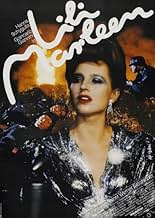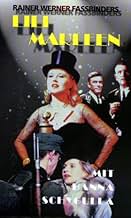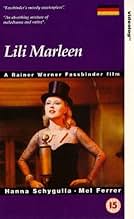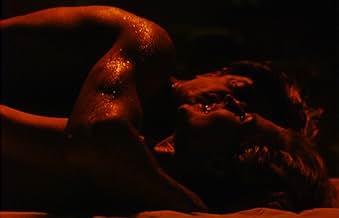NOTE IMDb
7,1/10
4,6 k
MA NOTE
En 1938, un chanteur allemand tombe amoureux d'un compositeur juif de Zurich, qui aide les Juifs à fuir l'Allemagne nazie. Elle est renvoyée en Allemagne. Sa chanson "Lili Marleen" devient u... Tout lireEn 1938, un chanteur allemand tombe amoureux d'un compositeur juif de Zurich, qui aide les Juifs à fuir l'Allemagne nazie. Elle est renvoyée en Allemagne. Sa chanson "Lili Marleen" devient un hit auprès des soldats et du top nazi.En 1938, un chanteur allemand tombe amoureux d'un compositeur juif de Zurich, qui aide les Juifs à fuir l'Allemagne nazie. Elle est renvoyée en Allemagne. Sa chanson "Lili Marleen" devient un hit auprès des soldats et du top nazi.
- Réalisation
- Scénario
- Casting principal
- Récompenses
- 1 victoire et 4 nominations au total
Karl-Heinz von Hassel
- Henkel
- (as Karl Heinz von Hassel)
Raúl Gimenez
- Blonsky
- (as Raul Giminez)
Avis à la une
Story of a song. And what song! In fact, the creation of Hans Leip and Norbert Schultze is the only character, a spell who creates existences, loves, tragedies with a sarcastic indifference. It is an obsessive music, soul of a ambiguous time of dreams and ideas intoxication, with old words and cruels ambitions.
Certainly, it is a Fassbinder's lesson about values and lies, about rules of war and feelings, about small victims and sacrifice.
Hanna Schygulla is gorgeous in a character's skin different of Lale Anderson or Marlene Dietrich but with the same art to describe the atmosphere of extincted space. In some moments I saw in parts of film elements of "Cabaret" Nazi song or "Satyricon" dances. It is normal: interpretation of song is not only piece of a show but rule of life. "Lili Marleen" is not the old "Das Lied eines Jungen Soldaten auf der Wacht" but hard of an universe, hypocrite, coward, frail.
The final meeting between Willie and Robert is only seal of ordinary tragedy. To late, to far.
Certainly, it is a Fassbinder's lesson about values and lies, about rules of war and feelings, about small victims and sacrifice.
Hanna Schygulla is gorgeous in a character's skin different of Lale Anderson or Marlene Dietrich but with the same art to describe the atmosphere of extincted space. In some moments I saw in parts of film elements of "Cabaret" Nazi song or "Satyricon" dances. It is normal: interpretation of song is not only piece of a show but rule of life. "Lili Marleen" is not the old "Das Lied eines Jungen Soldaten auf der Wacht" but hard of an universe, hypocrite, coward, frail.
The final meeting between Willie and Robert is only seal of ordinary tragedy. To late, to far.
Jolly good show eld chap - bit of a must see if you like that eld song... I don't know what the makers of this film were thinking, but it was obviously something along the lines of "Dash it all! We appear to got ourselves into a spot of bother here! Too many of the chaps and gels have accents which aren't quite up to par! Well, not to fear - technology to the rescue! I'll just call up the chaps at the club and get them to lend their distinguished Queens English voices to making this film a ripping english yarn about a German singer and a Swiss Jewish music artist..."
Well, the dubbing of an obviously English film with 'upper crust' English accents had me rolling in the aisles, snorting with laughter at some points throughout the film - it all rather distracted from what was really a very good film. Although the editing was a bit choppy in places (1970's relict directing?), the film faily trundles along providing a genteel look at the distractions and hardships WWII had on life in Europe. True, towards the end, one can sympathise with Giancarlo Giannini's 'torture' scene where the Germans lock him up in a room to listen to a couple of lines from the song, 'Lili Marleen' over and over again... How much was Giannini acting and how much was genuine suffering??? But, if you can overlook the dreadful dubbing, this is a good film!
Well, the dubbing of an obviously English film with 'upper crust' English accents had me rolling in the aisles, snorting with laughter at some points throughout the film - it all rather distracted from what was really a very good film. Although the editing was a bit choppy in places (1970's relict directing?), the film faily trundles along providing a genteel look at the distractions and hardships WWII had on life in Europe. True, towards the end, one can sympathise with Giancarlo Giannini's 'torture' scene where the Germans lock him up in a room to listen to a couple of lines from the song, 'Lili Marleen' over and over again... How much was Giannini acting and how much was genuine suffering??? But, if you can overlook the dreadful dubbing, this is a good film!
It is based on the song Lili Marleen, sung by Lale Andersen, and her romance with Rolf Liebermann in the movie Willie and Robert. The film tried to be very impartial in relation to Lale and Nazism, although she helped discreetly, and for Robert, the Allies, however in the end, she ended up surrendering to Nazism, to continue singing, to leave the Black List, had to change her famous song with a military air, she didn't marry Rolf, but kept an eternal friendship, could have done better...
Rainer Werner Fassbinder is an important (or maybe the most important) director of the "Neue Deutsche Welle" of the seventies and eighties.
Until now I had seen only one of his films ("Angst essen Seele auf", 1974), preferring another director of the "Neue Deutsche Welle" (Werner Herzog) instead.
Also with other filmmovements I often prefer another director above the leading figure. With the French "Nouvelle vague" for example I prefer Claude Chabrol above Jean Luc Godard.
Nevertheless only one film of such an important director felt as too little to me and I decided to watch some more if the opportunity arose.
The first opportunity was "Lili Marleen" (1981) and maybe this was not the best oppurtunity. "Lily Marleen" is from the later stages of Fassbinder's career. He was already a renowned director and for this production had the disposal over a big budget. His aim was a film that would also perform well at the American box office. The film was recorded in English but later dubbed in German when the American success failed to materialize.
The story is about the female singer Willie (Hanna Schygulla) who is very successful in Nazi circles, being with the resistance in her private life. As such the story has similarities with "Black book" (2006, Paul Verhoeven).
The song Willie has success with is "Lili Marleen", which was a real existing song during the Second World War performed by Lale Andersen. Also Marlene Dietrich would occasionaly perform this song.
In my opinion "Lili Marleen" is a rather conventional movie according to Fassbinder standards (or at least as I expect Fassbinder standards to be). The most striking scenes are those in which Willie is performing her song. These scenes are edited with both images of soldiers resting in their trenches and very brutal war violence. These scenes are however more theatrical than shocking.
Until now I had seen only one of his films ("Angst essen Seele auf", 1974), preferring another director of the "Neue Deutsche Welle" (Werner Herzog) instead.
Also with other filmmovements I often prefer another director above the leading figure. With the French "Nouvelle vague" for example I prefer Claude Chabrol above Jean Luc Godard.
Nevertheless only one film of such an important director felt as too little to me and I decided to watch some more if the opportunity arose.
The first opportunity was "Lili Marleen" (1981) and maybe this was not the best oppurtunity. "Lily Marleen" is from the later stages of Fassbinder's career. He was already a renowned director and for this production had the disposal over a big budget. His aim was a film that would also perform well at the American box office. The film was recorded in English but later dubbed in German when the American success failed to materialize.
The story is about the female singer Willie (Hanna Schygulla) who is very successful in Nazi circles, being with the resistance in her private life. As such the story has similarities with "Black book" (2006, Paul Verhoeven).
The song Willie has success with is "Lili Marleen", which was a real existing song during the Second World War performed by Lale Andersen. Also Marlene Dietrich would occasionaly perform this song.
In my opinion "Lili Marleen" is a rather conventional movie according to Fassbinder standards (or at least as I expect Fassbinder standards to be). The most striking scenes are those in which Willie is performing her song. These scenes are edited with both images of soldiers resting in their trenches and very brutal war violence. These scenes are however more theatrical than shocking.
Yes, there is such a thing, despite the fact that IMDb does not currently list it.
This film is a clever examination of how hard it was NOT to become part of the Nazi system. Willie is a German singer, in love with a Swiss Jewish conductor. She returns to Germany to help her lover with the resistance, however his father - who disapproves of their relationship - has arranged that she will not be able to return to Switzerland. Stranded in Berlin, Willie is forced to use a Nazi connection just to get some work...and he just happens to be the newly appointed Cultural Director. So Willie is given the opportunity to perform and record 'Lili Marleen'. The song becomes a hit, and Hitler becomes a fan. I won't go into the rest of the plot, but be assured that there are twists and turns.
By the end of this movie, you will not be able to get the song 'Lili Marleen' out of your head as it is repeated countless times. Believe me, I saw the film last week, and I am still singing it.
This film is a clever examination of how hard it was NOT to become part of the Nazi system. Willie is a German singer, in love with a Swiss Jewish conductor. She returns to Germany to help her lover with the resistance, however his father - who disapproves of their relationship - has arranged that she will not be able to return to Switzerland. Stranded in Berlin, Willie is forced to use a Nazi connection just to get some work...and he just happens to be the newly appointed Cultural Director. So Willie is given the opportunity to perform and record 'Lili Marleen'. The song becomes a hit, and Hitler becomes a fan. I won't go into the rest of the plot, but be assured that there are twists and turns.
By the end of this movie, you will not be able to get the song 'Lili Marleen' out of your head as it is repeated countless times. Believe me, I saw the film last week, and I am still singing it.
Le saviez-vous
- AnecdotesShot in English for American distribution; later dubbed in German
- GaffesKaufmann, the German officer who arrests Robert on the train, wears the uniform of an SS-Gruppenfuhrer (General) - it is highly unlikely that an SS General of such rank would be checking identity papers at random on a train.
- Bandes originalesLili Marleen
(German Version)
(based on a poem from the 1915 book "Die kleine Hafenorgel" by Hans Leip)
Music By Norbert Schultze,
Vocals Hanna Schygulla
(p) 1981 Schlicht Musikverlag, Phonogram, GmbH, DRG Records, Inc., Philips
© Metropolis Records
Published By Brampton Music Ltd., Chappell Music Ltd., Peter Maurice Music,
EMI Music
Meilleurs choix
Connectez-vous pour évaluer et suivre la liste de favoris afin de recevoir des recommandations personnalisées
- How long is Lili Marleen?Alimenté par Alexa
Détails
- Date de sortie
- Pays d’origine
- Langues
- Aussi connu sous le nom de
- La vida íntima de Lili Marleen
- Lieux de tournage
- Sociétés de production
- Voir plus de crédits d'entreprise sur IMDbPro
Box-office
- Budget
- 10 500 000 DEM (estimé)
- Montant brut aux États-Unis et au Canada
- 8 144 $US
- Week-end de sortie aux États-Unis et au Canada
- 11 623 $US
- 16 févr. 2003
- Montant brut mondial
- 8 158 $US
- Durée2 heures
- Mixage
- Rapport de forme
- 1.66 : 1
Contribuer à cette page
Suggérer une modification ou ajouter du contenu manquant

Lacune principale
By what name was Lili Marleen (1981) officially released in Canada in English?
Répondre

































